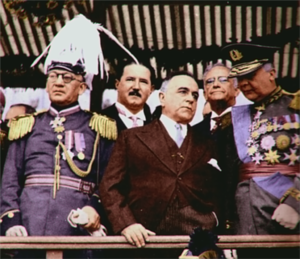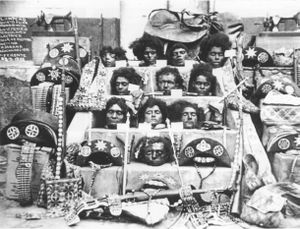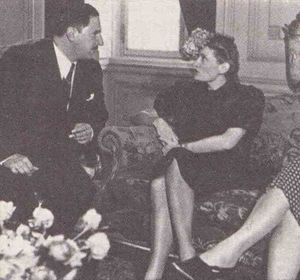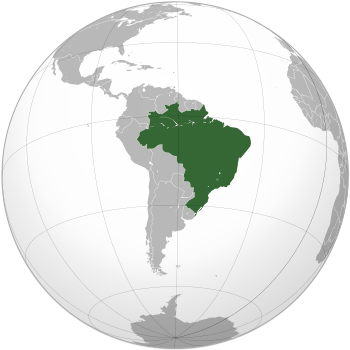إستادو نوڤو (البرازيل)
| ||||||||||||||||||||||||||||||||||||||||||||||||||||||||||||||||||||||||||||
إستادو نوڤو أو عصر ڤارگاس (بالبرتغالية: Era Vargas؛ البرتغالية البرازيلية: ['ɛɾɐ 'vaɾgɐs]) هو الفترة في تاريخ البرازيل بين 1930 و 1945، حين كان البلد تحت ديكتاتورية جيتوليو دورنلس ڤارگاس.
أشرت الثورة البرازيلية 1930 بنهاية الجمهورية القديمة. فأطيح بالرئيس واشنطن لويز؛ the swearing-in of President-elect Julio Prestes was blocked, on the grounds that the election had been rigged by his supporters; 1891 Constitution was abrogated, National Congress was dissolved and the provisional military junta ceded power to Vargas. Federal intervention in State governments increased and the political landscape was altered by suppressing the traditional oligarchies في ولايتي ساو پاولو و Minas Gerais.
تكون عصر ڤارگاس من ثلاث مراحل متتالية:
- فترة الحكومة المؤقتة (1930–1934)، when Vargas governed by decree as Head of the Provisional Government instituted by the Revolution, pending the adoption of a new Constitution.
- فترة دستور 1934، when a new Constitution was drafted and approved by the Constituent Assembly of 1933–34, and Vargas – elected by the Constituent Assembly under the transitional provisions of the Constitution – governed as President, alongside a democratically elected Legislature.
- فترة إستادو نوڤو (1937–1945)، that began when, in order to perpetuate his rule, Vargas imposed a new, authoritarian Constitution in a coup d'état, and shut down Congress, assuming dictatorial powers.
الاطاحة بجيتوليو ڤارگاس ونظام إستادو نوڤو في 1945 and the subsequent re-democratization of Brazil with the adoption of a new Constitution in 1946 mark نهاية عصر ڤارگاس وبداية الفترة المعروفة بإسم الجمهورية البرازيلية الثانية.
. . . . . . . . . . . . . . . . . . . . . . . . . . . . . . . . . . . . . . . . . . . . . . . . . . . . . . . . . . . . . . . . . . . . . . . . . . . . . . . . . . . . . . . . . . . . . . . . . . . . . . . . . . . . . . . . . . . . . . . . . . . . . . . . . . . . . . . . . . . . . . . . . . . . . . . . . . . . . . . . . . . . . . . .
سقوط الجمهورية القديمة
The tenente rebellion did not mark the revolutionary breakthrough for Brazil's bourgeois social reformers, but the ruling paulista coffee oligarchy could not withstand the economic meltdown of 1929.
صعود جيتوليو ڤارگاس
Aside from the Great Depression and the emergence of the Brazilian bourgeoisie, Brazil's historic dynamic of interregional politics was a significant factor encouraging the alliance that Getúlio Vargas forged during the Revolution of 1930 between the new urban sectors and the landowners hostile to the government in states other than São Paulo.
بعد ثورة 1930
نحو الديكتاتورية

By 1934 Vargas developed into what Thomas E. Skidmore and Peter H. Smith called "a legal hybrid" between the regimes of Mussolini's Italy and Salazar's Estado Novo. Vargas copied fascist tactics, and shared their rejection of liberal capitalism. He abandoned the arrangements of the "provisional government" (1930–34), that were characterized by social reformism that appeared to favor the generally left wing of his revolutionary coalition, the tenentes.
الكبت السياسي والتعذيب

إستادو نوڤو

الحرب العالمية الثانية


With the start of World War II, in 1939, Vargas maintained neutrality until 1941, when an agreement, proposed by Brazilian foreign relations minister Oswaldo Aranha, was formed between American continental nations to align with any American country in the event of an attack by an external power. Due to this agreement, from Pearl Harbor Brazil's entering the war became just a matter of time. American policy also financed Brazilian iron and steel extraction and placed military bases along the Brazilian North-Northeast coast, headquartered in Natal. With the conquest of Southeast Asia by Japanese troops, Getúlio signed a treaty, the Washington Accords, in 1942, which provisioned the supply of natural rubber from the Amazon to the Allies, resulting in the second rubber boom and the forced migration of many people from the drought-stricken northeast to the heart of Amazônia. These people were known as Soldados da Borracha ("rubber soldiers").

After the sinking of Brazilian merchant ships by German and Italian submarines throughout 1942, popular mobilization forced the Brazilian government to abandon its passiveness and declare war on Germany and Italy in August, 1942. Popular mobilization to make the war declaration effective, with the despatching of Brazilian troops to Europe, continued, but a decision by the Brazilian Government to actually send troops to fight the enemy was only made in January 1943, when Vargas and the U.S President Franklin Delano Roosevelt met in Natal, where the first official agreement was made to create an expeditionary force (BEF). في يوليو 1944 the first BEF group was sent to fight in Italy, and, despite being poorly equipped and trained, it accomplished its main missions.
انظر أيضاً
الهامش
. . . . . . . . . . . . . . . . . . . . . . . . . . . . . . . . . . . . . . . . . . . . . . . . . . . . . . . . . . . . . . . . . . . . . . . . . . . . . . . . . . . . . . . . . . . . . . . . . . . . . . . . . . . . . . . . . . . . . . . . . . . . . . . . . . . . . . . . . . . . . . . . . . . . . . . . . . . . . . . . . . . . . . . .
ببليوگرافيا
- Castro, Celso; Izecksohn, Victor; Kraay, Hendrik (2004). Nova História Militar Brasileira. Fundação Getúlio Vargas. ISBN 85-225-0496-2. in Portuguese
- Ready, J. Lee (1985). Forgotten Allies: The European Theatre, Volume I. McFarland & Company. ISBN 978-0-89950-129-1.
- Brazil Now.Info Estado Novo.
- Garfield, Seth. "The Roots of a Plant That Today Is Brazil: Indians and the Nation-State under the Brazilian Estado Novo" Journal of Latin American Studies Vol. 29, No. 3 (Oct., 1997), pp. 747–768
- Pages using infobox country with unknown parameters
- Pages using infobox country or infobox former country with the flag caption or type parameters
- Pages using infobox country or infobox former country with the symbol caption or type parameters
- Portal-inline template with redlinked portals
- Pages with empty portal template
- التاريخ الحديث للبرازيل
- القرن العشرون في البرازيل
- التكاملية
- تأسيسات 1930 في البرازيل
- انحلالات 1945 في البرازيل





